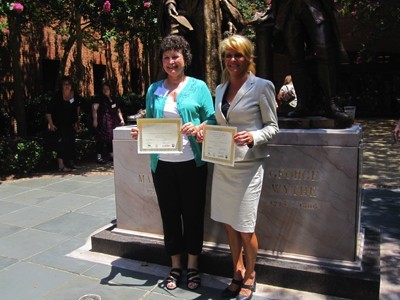|
|
The Special Ed Advocate newsletter
It's Unique ... and Free! |
|
|
|
2026
Training Programs |
March 12, 2026 - Long Island, NY
March 26, 2026 - San Antonio, TX
May 9, 2026 - WV via ZOOM
July 7, 2026 - Buffalo, NY
Sept. 17, 2026 MD via ZOOM
Full Schedule
|
|
Wrightslaw |
|
Home
About Pete
About Pam
Topics from A-Z
Free Newsletter
Seminars & Training
Yellow Pages for Kids
Press Room
FAQs
Sitemap |
|
Books & Training |
|
Wrightslaw Store
Advocate's Store
Student Bookstore
Exam Copies
Training Center
Mail & Fax Orders |
Advocacy Library |
Articles
Cool Tools
Doing Your Homework
Ask the Advocate
FAQs
Newsletter Archives
Short Course Series
Success Stories
Tips
|
Law Library |
Articles
Caselaw
Fed Court Complaints
IDEA 2004
McKinney-Vento Homeless
FERPA
Section 504
|
Topics |
Advocacy
ADD/ADHD
Allergy/Anaphylaxis
American Indian
Assistive Technology
Autism Spectrum
Behavior & Discipline
Bullying
College/Continuing Ed
Damages
Discrimination
Due Process
Early Intervention
(Part C)
Eligibility
Episodic, such as
Allergies, Asthma,
Diabetes, Epilepsy, etc
ESSA
ESY
Evaluations
FAPE
Flyers
Future Planning
Harassment
High-Stakes Tests
Homeless Children
IDEA 2004
Identification & Child Find
IEPs
Juvenile Justice
Law School & Clinics
Letters & Paper Trails
LRE / Inclusion
Mediation
Military / DOD
Parental Protections
PE and Adapted PE
Privacy & Records
Procedural Safeguards
Progress Monitoring
Reading
Related Services
Research Based
Instruction
Response to Intervention
(RTI)
Restraints / Seclusion
and Abuse
Retention
Retaliation
School Report Cards
Section 504
Self-Advocacy
Teachers & Principals
Transition
Twice Exceptional (2e)
VA Special Education |
Resources & Directories |
Advocate's Bookstore
Advocacy Resources
Directories
Disability Groups
International
State DOEs
State PTIs
Free Flyers
Free Pubs
Free Newsletters
Legal & Advocacy
Glossaries
Legal Terms
Assessment Terms
Best School Websites |
| |
|
Print this page
When Teachers Bully
by Parent Advocate Susan Bruce
 Boy, this is a sad, familiar problem. My son Alex is on the spectrum. When he was in middle school, two teachers bullied him repeatedly. If your child is being bullied, or you know a child who is being bullied, I have suggestions about how to stop the problem without bringing more harm to your child. Boy, this is a sad, familiar problem. My son Alex is on the spectrum. When he was in middle school, two teachers bullied him repeatedly. If your child is being bullied, or you know a child who is being bullied, I have suggestions about how to stop the problem without bringing more harm to your child.
I learned that Alex was being bullied when he came to me after school. He was crying and said, “Mom, why do the teachers treat me like a freak?” This broke my heart. Couldn’t the teachers see what a precious young man he was?
My first instinct was to go into the “mama bear” mode. But I’ve learned that my first knee-jerk reaction is never the right way to handle a difficult situation with the school.
Instead, I began to gather information and documents - data. I organized the documentation I had, then moved on to what my son and his twin brother said was happening.
1. What documentation did I have?
Alex never had any disciplinary action taken against him by the school. Never!
Early on, I learned that you must document everything with the school – the good, the bad, and the ugly. You never know when you may need documents (evidence) to support your position.
As I reviewed my son’s records, I found seventeen emails from school personnel who described Alex as a ”fine and upstanding young man.” One teacher wrote, “I trust him above all others.” I printed these emails.
2. I asked questions.
I talked with Alex and his brother and asked questions about the bullying using the 5 W’s + H + E method.
Q: Who is bullying you?
A: Two teachers who haven’t taught Alex.
Q: Where does the bullying happen?
A: It happens in the hallway where these teachers have their classrooms.
Q: When does the bullying happen?
A: It happens during class changes and sometimes at lunch. A group of teachers stands outside their classrooms to monitor the halls. This group includes five teachers who taught Alex and two teachers who have not taught him.
Q: What do the teachers do? Explain what the bullying looks like.
A: The teachers do not allow Alex to use the water fountain or go to his locker on “their side of the hall.” They do not allow Alex near any of “their students.” They make fun of him in front of other kids in the hall and in the lunchroom.
Q: Why do you think the teachers are acting this way?
Alex’s brother thought it was because a female student had said untrue things about Alex on social media. The girl was a student of both teachers.
I had already expressed concerns about this girl to the school. I printed her social media pages.
Next Steps
I knew if I went directly to the principal, he would report our conversation to the teachers. They would circle their wagons to protect each other.
Although the teachers who taught Alex were good to him, I thought they were likely to protect the other teachers.
Teacher Contact
I began by sending emails to Alex’s teachers. I asked if they had observed any behavior problems during class changes or lunch.
Because Alex’s teachers were members of his IEP team, they were aware that Alex had emotional difficulties related to ADHD and Asperger’s. Alex was behind socially and emotionally. He did not handle social situations and relationships like a typical kid his age.
One teacher responded, “He is still weepy and cries at times, but he is such a sweet boy. He is no problem at all.” The other teachers’ responses were similar.
Documentation Letter
I wrote an email to the principal documenting the teachers’ behavior, and leaving out much of the data I had gathered. I expected the teachers to claim that Alex was harassing the girl in the hall. I waited for the response I expected to get. I received the expected response from the principal within minutes.
I noted that I had emails from five other teachers on the same hallway who stated that Alex was “weepy” and “cries at times.” These teachers reported that Alex did not have any behavior issues or behavior problems in the hall. I advised the principal, “It is interesting these teachers are seeing behavior that no one else sees.”
In my email, I put the principal on notice about his teacher bullying problems. I advised that I would hold him accountable for any more psychological damage or trauma caused by disability harassment and/or discrimination under Section 504 of the Rehabilitation Act.
I took things a step further when I mentioned that I had seventeen more emails from Alex’s teachers, all reporting that Alex was a fine, upstanding young man. I copied Alex’s special ed coordinator on my email.
Within minutes of hitting the send button, the school responded. School staff wanted to meet with me the next morning at 10 am. I gathered all my documentation, including the printed copies of emails and social media pages.
Meeting with the School
When I arrived at the meeting, all three building administrators and other school district personnel were there. I was ready for them.
As I expected, they said that the teachers believed that Alex was harassing the female student.
First, I produced the printed social media pages – information showing that the girl, not Alex, was the culprit.
Next, I presented them with data on Alex’s behavior that I had collected during the three years he attended their school.
Finally, I advised that I was prepared to take the steps necessary to hold the school and these teachers accountable under the law.
Suddenly, the tone of the meeting shifted. I was on the offense, not on the defense. They asked, “What can we do?”
First, the bullying by the teachers and the female student had to stop immediately.
Second, the administrators had to agree to advise the teachers about what had happened, about Alex’s disability, and about their responsibilities under the law. Finally, I wanted them to reprimand the girl.
The bullying and harassment stopped that day.
Takeaways
1. Document everything - good, bad, and ugly.
How do you document good things? If a teacher stops you in the car line and compliments your child, be sure to send her a thank you note that documents this conversation.
2. Monitor your child’s social media activity. Print anything that looks unusual or suspicious.
3. When you have a problem to solve, do not react immediately unless there are serious safety concerns. Your knee-jerk reaction is rarely the right action.
4. Be discreet. When you ask questions, listen carefully to the answers. When you ask for an opinion, do not mention the opinions of others.
5. Believe your child! Believe in your child.
6. Keep copies of your child’s education records. Identify information that supports your position and requests.
7. Do not threaten. After I learned that the teachers were bullying Alex, I fully intended to take the school to the mat if necessary. The school knew I had enough documentation (evidence) to do that.
Susan Bruce
 Susan’s most relevant experience is as the mother of four, three of which are students with disabilities. Susan’s next most relevant experience is as a ten year parent advocate and trainer with South Carolina’s former Parent Training and Information Center, PRO*Parents of SC. Susan has trained over 5000 parents, attorneys and advocates during her tenure with PRO*Parents on virtually any topic that has to do with special education and civil rights law. Susan’s most relevant experience is as the mother of four, three of which are students with disabilities. Susan’s next most relevant experience is as a ten year parent advocate and trainer with South Carolina’s former Parent Training and Information Center, PRO*Parents of SC. Susan has trained over 5000 parents, attorneys and advocates during her tenure with PRO*Parents on virtually any topic that has to do with special education and civil rights law.
Susan’s passion for assisting parents and extensive knowledge of the practical application of the Individuals with Disabilities Education Act along with other laws applying to children makes her a fierce advocate for students. The training she has received over the last ten years is second to none. Susan has trained under some the nation’s leading advocates and attorneys, such as Chris Ziegler Dendy, Rick Lavoie, Matt Cohen and Pete Wright of www.wrightslaw.com.
A Board Member of COPAA (Council of Parent Attorneys and Advocates) for 4 years and a member for 7 years, she serves as the board secretary as well as serving on COPAA's executive committee. She also sits on the media relations, advocate and conference committees. Susan has honed her skills by attending COPAA’s National Conference for the last 7 years, presenting sessions at the last 6 and was asked by COPAA to provide the two day advocate training at their preconference for the last 3 years. She has a certificate from the William and Mary School of Law Institute of Special Education Advocacy and holds certificates in non-profit management from Duke and Winthrop University. However, Susan believes that her expertise actually lies in a specialized field that in all actuality can only be obtained by hands on experience and is not taught in any university setting.
Susan continues to hone her skills by continually training, she believes that a vital part of advocacy lies in staying abreast of ever changing case law, scientific research and guidance from the US Department of Education and the Office of Civil Rights.
Susan is a published author, her articles on special education and Section 504 have been published by advocacy organizations all over the country.
 July 2012 - William and Mary Law School Institute of Special Education Advocacy July 2012 - William and Mary Law School Institute of Special Education Advocacy
Susan Bruce (with Mary Eaddy) receives her certificate from ISEA 2012 at the W&M Law School Institute of Special Education Advocacy for advanced advocates.
Contact information
864-305-9969
susan@spedad.com or susan.spedad@gmail.com
Created: 08/25/15
|
|

